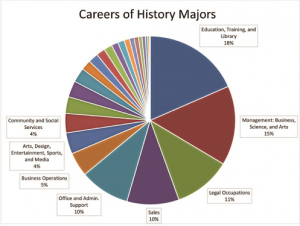Careers After Carolina
Our majors and prize-winning students do not just learn about the past: they produce and publish historical knowledge of their own, based on their research in our 398 seminars, Senior Honors Thesis program, and other classes. After graduation, their knowledge and skills can open doors to many different career paths.
Students are: Publishing their Research, Winning Fellowships, Grants, and Prizes, Studying Abroad, and Doing Internships.
Undergraduates in the History Department can now benefit from the expertise of the newly formed Career Mentor Coalition. For more information, please see this flyer.
Careers with a UNC History Degree
The study of History enriches a student’s life in many ways, deepening her or his understanding of the human experience in the past and by extension in the present. At the same time, pursing a History major opens many doors to many rewarding career paths. An informal survey of profiles on Linkedin finds former Carolina History majors working at law firms, as teachers, as research and development officers for employers like the Memorial Sloan Kettering Cancer Center, for public radio, and also for non-profit and philanthropic organizations such as the World Resources Institute and the Pew Charitable Trusts, among other jobs.
People sometimes assume that the History major and other liberal-arts degrees put students at a disadvantage in the search for a job—but the facts don’t back this up. As Paul Sturtevant puts it in “History Is Not a Useless Major: Fighting Myths with Data,” many prospective students have been convinced that “the only safe path to a well-paying job is through a STEM major. Members of the academy—including STEM faculty themselves—have repeatedly challenged assertions that majoring in the humanities is useless. And employers of STEM graduates say that they value skills cultivated in a wide-ranging curriculum.” Data gathered from the American Community Survey (ACS) debunks several “myths” about the employability of History majors, including the belief that they are consistently underemployed and underpaid. Consider this chart of various career tracks for History Majors from Sturtevant’s study:
A 2016 article in the Wall Street Journal,“Good News Liberal-Arts Majors: You Do Just Fine,” made some similar observations about humanities and social sciences degrees in general, including History, noting that while graduates in such majors might make less than their peers in “career-tailed majors,” their earnings catch up over time, and sometimes surpass them. Or, see the American Historical Association‘s thoughts on “Careers for history majors.”
Don’t take our word for it: watch the videos below to hear from some former majors about how the study of history helped to shape their prospects, success, and careers.
Tyler Fleming (Class of 2018) Cassandra Etter-Wenzel (Class of 2013)In 2018, recent studies from Gallup and the American Academy of Arts & Sciences shared these stats:
- 87% of graduates with humanities degrees report being satisfied with their work. This is more so than other graduates in almost every other field.
- Less than 3% of graduates with humanities degrees report being unemployed. This is lower than the average 4.3% unemployment across all majors/degrees.
- 60% of graduates with humanities degrees report working in supervisory roles.
- More than 70% of graduates with humanities report being “deeply interested” in their job.
Employability skills which History majors possess that are highly valued by employers (NACE, 2017). These include Imagination (Creativity); Research; Analytical Thinking; Writing(Communication); and Organization.
According to data gathered by Career Services at UNC-Chapel Hill, these are some of the different industries History majors have entered post-graduation (FDS, Class of 2017):
- Consulting
- Consumer Products/Trade
- Education
- Government
- Media/Communications
- Non-Profit
- Tech
Many Carolina undergraduates don’t feel like they have to choose, double-majoring in History and another field such as biology, math, or chemistry. As one recent undergraduate (K. Grant, Class of 2018) described her experience as a double-major, “While I have been primarily involved in the STEM aspect of the university during my time at UNC, I truly believe that my history major has provided me with skills that I will utilize for the rest of my life.”
Another graduate, Matthew S (Class of 2018) said, “Aside from studying history at Carolina, I also majored in Statistics & Analytics. I always thought I was studying history for fun and math/stats for my professional life, but I’m consistently reminded how wrong I was. The reading, research, writing, and editing skills I picked up throughout all of my history courses have probably been more helpful to make me stand out in interviews and useful in my work than my quantitative skills. “

